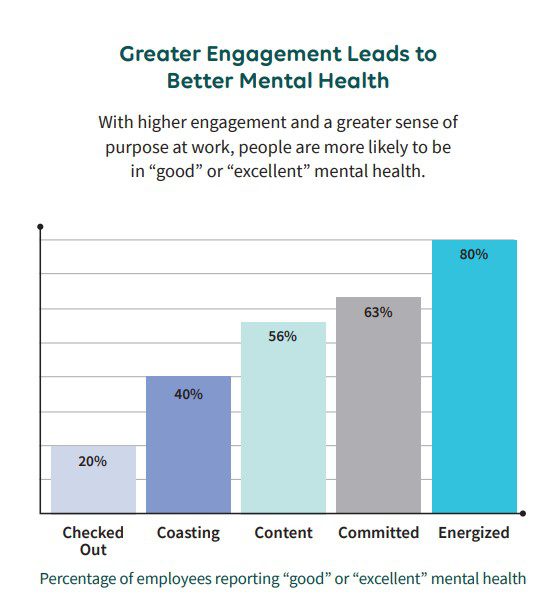Managers are key to improving wellbeing
But they also need support from HR and the C-Suite.
Why You Should Care
Employers aren't taking burnout seriously.
If they want engaged, happy and productive workforces, they need to change their approach.
According to UKG, managers are the secret to success around wellbeing.
Burnout is a major challenge for employers. Stress is at an-all time high, according to Gartner, and this is impacting employee engagement and productivity at work, as well as retention.
Despite the data on burnout, employers are still underestimating the scale of the problem. According to a survey of 3,400 individuals in 10 countries by UKG’s Workforce Institute, nine in ten HR and C-Suite leaders believe that working for their company had a positive impact on employee mental health, but only half of employees agree.
60% said that their job has the biggest impact on their mental health, while 40% said they were often or always stressed at work, and this was impacting their home lives (71%) and personal relationships (62%).
Employees who struggle with their workloads are far more likely to report poor or very poor mental health (25% versus 8%), as well as to see that their job has a direct, detrimental effect on their wellbeing (51% versus 20%).
The solution, according to UKG’s report, is managers. 69% said their managers impact their mental health, compared to 51% for doctors and 41% for therapists.
One in three said their manager is unaware of the impact they have on their team’s wellbeing – and seven in ten want their managers to do more around mental health.
Communication is key to wellbeing
The problem is that employees aren’t telling their managers their challenges; they are suffering in silence.
31% said they rarely or never talk about their workload with managers, this was because they think their manager wouldn’t care (21%), their manager is too busy (12%) or employees feel like they should be able to figure out the solution themselves (14%).
So to mitigate burnout and stress at work, managers need to create an open dialogue with their teams around their struggles.
To do this, it is crucial that managers open up about their own personal stresses. UKG’s report found that although 35% of employees are stressed, this rises to 42% for managers.

Credit: Mental Health at Work: Managers and Money.
HR’s role is to facilitate better conversations between managers and employees, as well as to support managers with their wellbeing challenges.
In addition, UKG’s HR business partner for EMEA Rebecca Taylor tells UNLEASH: “HR can have a meaningful impact on the employee experience by ensuring that they are supporting employees with their basic needs such as a livable wage and relevant benefits along with retirement and pensions support.
“A crucial part of this is supporting purposeful work and connecting employees to their jobs by providing career growth opportunities and autonomy over their jobs.
“It’s also vital that employers are offering employees flexibility and regularly recognizing and celebrating success.”
If employers can take this advice and tackle burnout and stress in their workplaces, they will resolve their retention challenges. Interestingly, UKG’s report found that 80% of employees would rather have good mental health than a high paying job, with two in three willing to take a pay cut for a job that better support wellness.
If this article caught your interest, you can find more like it here. Enjoy!
Sign up to the UNLEASH Newsletter
Get the Editor’s picks of the week delivered straight to your inbox!

Chief Reporter
Allie is an award-winning business journalist and can be reached at alexandra@unleash.ai.
-
Topics
Strategy and Leadership
Wellbeing
